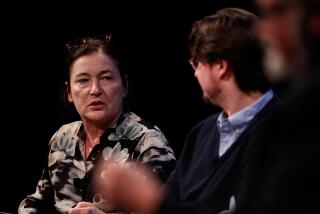To Please a Shadow : Joseph Brodsky’s Seduction of the Muse in English
When a writer resorts to a language other than his mother tongue, he does so either out of necessity, like Conrad, or because of burning ambition, like Nabokov, or for the sake of greater estrangement, like Beckett. Belonging to a different league, in the summer of 1977, in New York, after living in this country for five years, I purchased in a small typewriter shop on Sixth Avenue a portable “Lettera 22” and set out to write (essays, translations, occasionally a poem) in English for a reason that had very little to do with the above. My sole purpose then, as it is now, was to find myself in closer proximity to the man whom I considered the greatest mind of the 20th Century: Wystan Hugh Auden.
I was, of course, perfectly aware of the futility of my undertaking, not so much because I was born in Russia and into its language (which I am never to abandon--and I hope vice versa) as because of this poet’s intelligence, which in my view has no equal. I was aware of the futility of this effort, moreover, because Auden had been dead four years then. Yet to my mind, writing in English was the best way to get near him, to work on his terms, to be judged, if not by his code of conscience, then by whatever it is in the English language that made this code of conscience possible.
These words, the very structure of these sentences, all show anyone who has read a single stanza or a single paragraph of Auden’s how I fail. To me, though, a failure by his standards is preferable to a success by others’. Besides, I knew from the outset that I was bound to fail; whether this sort of sobriety was my own or has been borrowed from his writing, I can no longer tell. All I hope for while writing in his tongue is that I won’t lower his level of mental operation, his plane of regard. This is as much as one can do for a better man: to continue in his vein; this, I think, is what civilizations are all about.
I knew that by temperament and otherwise, I was a different man, and that in the best case possible I’d be regarded as his imitator. Still, for me that would be a compliment. Also I had a second line of defense: I could always pull back to my writing in Russian, of which I was pretty confident and which even he, had he known the language, probably would have liked. My desire to write in English had nothing to do with any sense of confidence, contentment, or comfort; it was simply a desire to please a shadow. Of course, where he was by then, linguistic barriers hardly mattered, but somehow I thought that he might like it better if I made myself clear to him in English. (Although when I tried, on the green grass at Kirchstetten 11 years ago now, it didn’t work; the English I had at that time was better for reading and listening than for speaking. Perhaps just as well.)
To put it differently, unable to return the full amount of what has been given, one tries to pay back at least in the same coin. After all, he did so himself, borrowing the “Don Juan” stanza for his “Letter to Lord Byron” or hexameters for his “Shield of Achilles.” Courtship always requires a degree of self-sacrifice and assimilation, all the more so if one is courting a pure spirit. While in the flesh, this man did so much that belief in immortality of his soul becomes somehow unavoidable. What he left us with amounts to a gospel which is both brought about by and filled with love that’s anything but finite--with love, that is, which can in no way all be harbored by human flesh and which therefore needs words. If there were no churches, one could easily have built one upon this poet, and its main precept would run something like his
If equal affection cannot be,
Let the more loving one be me.
--
If a poet has any obligation toward society, it is to write well. Being in the minority, he has no other choice. Failing this duty, he sinks into oblivion. Society, on the other hand, has no obligation toward the poet. A majority by definition, society thinks of itself as having other options than reading verses, no matter how well written. Its failure to do so results in its sinking to that level of locution at which society falls easy prey to a demagogue or a tyrant. This is society’s own equivalent of oblivion; a tyrant, of course, may try to save his subjects from it by some spectacular blood bath.
I first read Auden some 20 years ago in Russia in rather limp and listless translations that I found in an anthology of contemporary English poetry subtitled “From Browning to Our Days.” “Our Days” were those of 1937, when the volume was published. Needless to say, almost the entire body of its translators along with its editor, M. Gutner, were arrested soon afterward, and many of them perished. Needless to say, for the next 40 years no other anthology of contemporary English poetry was published in Russia, and the said volume became something of a collector’s item.
One line of Auden in that anthology, however, caught my eye. It was, as I learned later, from the last stanza of his early poem “No Change of Place,” which described a somewhat claustrophobic landscape where “no one goes / Further than railhead or the ends of piers, / Will neither go nor send his son. . . .” This last bit, “Will neither go nor send his son,” struck me with its mixture of negative extension and common sense. Having been brought up on an essentially emphatic and self-asserting diet of Russian verse, I was quick to register this recipe whose main component was self-restraint. Still, poetic lines have a knack of straying from the context into universal significance, and the threatening touch of absurdity contained in “Will neither go nor send his son” would start vibrating in the back of my mind whenever I’d set out to do something on paper.
This is, I suppose, what they call an influence, except that the sense of the absurd is never an invention of the poet but is a reflection of reality; inventions are seldom recognizable. What one may owe here to the poet is not the sentiment itself but its treatment: quiet, unemphatic, without any pedal, almost en passant . This treatment was especially significant to me precisely because I came across this line in the early 1960s, when the Theater of the Absurd was in full swing. Against that background, Auden’s handling of the subject stood out not only because he had beaten a lot of people to the punch but because of a considerably different ethical message. The way he handled the line was telling, at least to me: something like “Don’t cry wolf” even though the wolf’s at the door. (Even though, I would add, it looks exactly like you. Especially because of that, don’t cry wolf.)
Although for a writer to mention his penal experiences--or for that matter, any kind of hardship--is like dropping names for normal folk, it so happened that my next opportunity to pay a closer look at Auden occurred while I was doing my own time in the North, in a small village lost among swamps and forests, near the polar circle. This time the anthology that I had was in English, sent to me by a friend from Moscow. It had quite a lot of Yeats, whom I then found a bit too oratorical and sloppy with meters, and Eliot, who in those days reigned supreme in Eastern Europe. I was intending to read Eliot.
But by pure chance the book opened to Auden’s “In Memory of W. B. Yeats.” I was young then and therefore particularly keen on elegies as a genre, having nobody around dying to write one for. So I read them perhaps more avidly than anything else, and I frequently thought that the most interesting feature of the genre was the authors’ unwitting attempts at self-portrayal with which nearly every poem “in memoriam” is strewn--or soiled. Understandable though this tendency is, it often turns such a poem into the author’s ruminations on the subject of death, from which we learn more about him than about the deceased. The Auden poem had none of this. . . .
Excerpted from the essay “To Please a Shadow” from “Less Than One” by Joseph Brodsky, the 1987 Nobel laureate in literature. 1983. Reprinted by permission of Farrar, Straus & Giroux.
Drawing by David Levine. Reprinted with permission from the New York Review of Books. 1965, Nyrev Inc.
More to Read
Sign up for our Book Club newsletter
Get the latest news, events and more from the Los Angeles Times Book Club, and help us get L.A. reading and talking.
You may occasionally receive promotional content from the Los Angeles Times.







